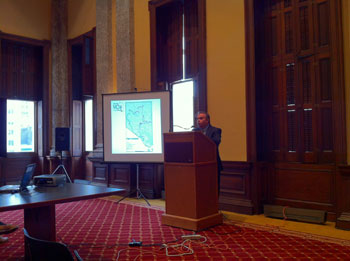A $2 million overbuild to Baltimore city’s 54-mile-long fiber ring will not only strengthen the city’s public safety radio system, but also be the first major step in possibly extending broadband access to areas of Baltimore city lacking it.
The Mayor’s Office of Information Technology (MOIT) will seek to to repair and replace fiber on the existing network, which is pushing 40 years old, instead of lay down new fiber, a costly proposition for many U.S. cities. City CTO Chris Tonjes laid out the city’s fiber overbuild plan at a meeting organized by gb.tc during September’s Baltimore Innovation Week.
As Tonjes said, there are three main goals for the city’s fiber-overbuild strategy, an improvement project scheduled to take about 18 months:
- To strengthen the city’s public safety radio network and connect all government buildings to the fiber ring, which is a network of broadband infrastructure.
- To make inroads at bridging the digital divide. “Equity is a really important part of this,” Tonjes said.
- Fostering economic development in places such as the Carroll Industrial Park and neighborhoods in the immediate vicinity of the Horseshoe Casino now being built on Russell Street.
Tonjes said the overbuild will be distributed among four phases, the first of which — an inter-connect to hook up the statewide Inter-County Broadband Network (ICBN) to Baltimore city’s 800MHz fiber ring — was completed as of the end of September.
This Inter-County-Connect allows Baltimore city to tap into the thousand-mile-plus, one-gigabit-speed ICBN fiber network in Anne Arundel and Baltimore counties. City and state agencies typically use fiber networks in the course of computer-aided dispatch and public safety efforts. A high-speed network, such as the ICBN, allows city agencies to communicate directly with public safety agencies in other counties much more quickly.
That interconnect was completed courtesy of a $4.3 million grant from the federal government, money initially given to the ICBN project as one big pie, and then doled out to various jurisdictions statewide. The money paid for 19.5 new miles of fiber in the city, and connected all the city’s firehouses to the ICBN and helped set up 18 new CCTV cameras on Pennsylvania Avenue.
While the ICBN connects to the city’s 54-mile (not 25-mile, as Technical.ly Baltimore has incorrectly reported before) fiber ring, it’s not the same thing as the overbuild project, an effort that will completed over the remaining three phases MOIT has sketched out to ensure the stability of the city’s public safety radio network and to try to entice outside Internet-service providers and anchor institutions (libraries, schools and the like) to lease bandwidth on the fiber ring from the city.
Leasing bandwidth to third-party providers will be important, as MOIT must pay back the total cost of this project, which is $2 million, within five years. The money for the overbuild comes from the city’s Innovation Fund, a grant applied for and received by the MOIT during the tenure of Rico Singleton, Tonjes’ predecessor as Baltimore city CTO.
But third-party providers and anchor institutions leasing bandwidth from an improved fiber ring is also essential to expanding broadband Internet to areas of the city Tonjes calls “digital deserts.” MOIT claims its goal is “100 percent access for all Baltimoreans, regardless of neighborhood.”
In August the city signed a $157,000 contract to bring on Magellan Advisors as a consultant to consider the costs and risks over expanding the city’s fiber capabilities, a “smart start” according to the Institute for Local Self-Reliance, which advocates for U.S. cities to own their own fiber networks.
Join the conversation!
Find news, events, jobs and people who share your interests on Technical.ly's open community Slack

Baltimore daily roundup: Medtech made in Baltimore; Sen. Sanders visits Morgan State; Humane Ai review debate

Baltimore daily roundup: The city's new esports lab; a conference in Wilmington; GBC reports $4B of economic activity

Baltimore daily roundup: Find your next coworking space; sea turtle legislation; Dali raided and sued


